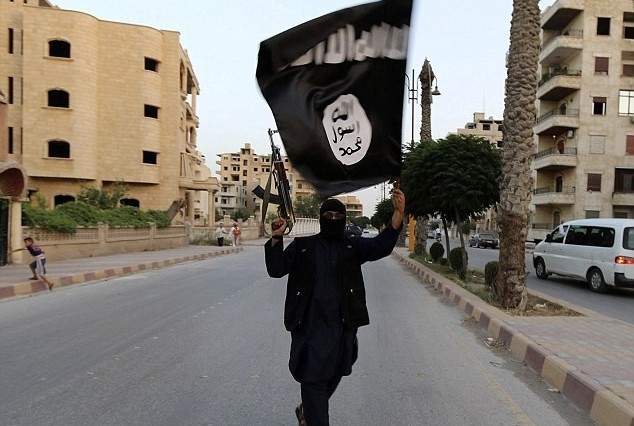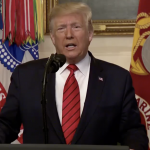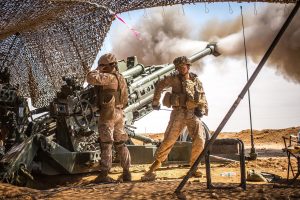by Wayne White
American political and media commentary on ISIS (which calls itself the Islamic State) since the beheading of James Foley has been flush with exaggeration and skewed focus. Identifying Foley’s murderer is desirable but far less important than tackling ISIS proper and its leadership. Unfortunately, many ISIS cadres have done far worse off camera. The voice narrating the video of Foley’s execution was British, and he was probably chosen by ISIS leader Abu Bakr al-Baghdadi simply to produce maximum shock effect in the West.
Most importantly, ISIS faces numerous challenges in holding onto what it has now, particularly in Iraq, where further expansion will likely be marginal. There are also ISIS vulnerabilities to be exploited by a new Iraqi government with much broader appeal. ISIS clearly poses a threat to the US (and other countries), but that threat needs to be soberly assessed.
Dialing Down the Hysteria
The beheading of Foley, a dreadful and tragic event, sparked a surge of gloom, doom, and hype among senior US officials and within the media at large. Of late, estimates of total ISIS fighters and foreign recruits have soared, but are based on what could only be iffy information. This is precisely what ISIS’s leaders intended.
ISIS perceives, as do other ruthless entities, that the US (and its allies) are traumatized far more by the death of one citizen than vastly broader atrocities in the Middle East. Hurt by US airstrikes (and fearing more) ISIS hoped to frighten Americans enough to make Washington back off. In that sense, the execution boomeranged: US and Western leaders are more alarmed, but determined to ramp up, not relax, measures against the radical Sunni group.
ISIS is dangerous, but its nature and the threat it represents must be defined accurately. A bizarre characterization of ISIS was made by Joint Chiefs Chairman General Martin Dempsey last week when he said ISIS has an “apocalyptic, end of days strategic vision.” This concept relates more closely to the Biblical New Testament Book of Revelation, reflecting mostly Christian, not Islamic, thinking. In fact, ISIS’s strategic vision, in historical terms, is rather pedestrian, albeit infused with barbarism: a quest to establish its version of a state, reinforce its power, defend or expand its present conquests, and lash out at its enemies.
Territorially, ISIS is weaker than suggested by the lurid maps showcased regularly by the media. Over 90% of the land under ISIS control is the driest, most underpopulated, and poorest in the greater Fertile Crescent region. In that respect, some of its holdings in Iraq are its most valuable assets, including large intact cities along rivers.
Vulnerabilities
The militant al-Nusra Front (less abusive than ISIS, and clashing with it in Syria) is well aware of ISIS’s vulnerability to foreign military action. It is no coincidence that al-Nusra released American hostage Peter Theo Curtis only days after Foley’s murder. Al-Nusra evidently is afraid of a harsh US response against ISIS, and hopes to keep out of the line of fire.
Despite the extent of its success, ISIS does not have a very large army of dedicated fighters. Its fanaticism and its use of shock, awe, and terror have been force multipliers. However, spread thin along the edges of its sprawling realm, it recognizes increased American aerial attacks in support of better-equipped Kurdish and revitalized Iraqi Army units could threaten areas far beyond just the Mosul Dam.
The heavy weapons ISIS secured while seizing Mosul and has since used to its advantage are largely irreplaceable, and continuing US air attacks would erode that edge quite a lot. At some point, ISIS could be reduced to fighting much as it did before—as light infantry.
Furthermore, having generated a more intense foreign and Iraqi domestic reaction, if faced with stiffer opposition simultaneously in both Syria and Iraq, ISIS would have to juggle its limited forces among various threatened sectors (always dicey). ISIS has also been fighting behind its own lines against surrounded Iraqi garrisons in one city, a major dam, Iraq’s largest refinery, several towns, and some areas dominated by hostile Sunni Arab tribes.
Many non-extremist ISIS Iraqi allies are potentially unreliable. However, ISIS does not have enough core combatants to fully occupy its vast holdings, so it depends heavily upon these allies.
As with its al-Qaeda in Iraq (AQI) predecessor, the restrictions and abuses committed by ISIS will eventually alienate many localities, secular Sunni Arab factions, and tribes. To keep tribes, Ba’athists, and former insurgents who do not share its fanatical vision loyal, ISIS might have to spread around some of its money.
Yet, in the face of airstrikes and warnings of worse from the Jordanians, Saudis and others close to former Sunni Arab Iraqi military officers and certain tribes, these fellow travelers could get very nervous about their future with ISIS. And with their prior nemesis in Baghdad, Nouri al-Maliki, gone, cutting a deal with a new government while decent terms can still be achieved could begin to look very inviting.
A New and Improved Iraqi Government?
To encourage the desertion of ISIS’s allies, prime minister-designate Haider al-Abadi must put together a new government tailored to—despite Baghdad’s political snake pit—reduce the Sunni Arab grievances upon which ISIS thrives. Grand Ayatollah Ali al-Sistani, a source of emulation for nearly all Iraqi Shi’a, knows this.
He appealed at prayers on Aug. 22 for a government made up of leaders who care about Iraq’s “future and its citizens,” regardless of their ethnic and religious affiliations, in a “realistic” fashion. Sistani’s pressure on Iraq’s dominant Shi’a majority politicians already made the difference in ousting Maliki. Hopefully, Sistani will keep the heat on until such a government is formed.
If many of ISIS’s allies are not wooed away, even a considerably revitalized Iraqi Army and Peshmerga supported by airstrikes might make only slow, costly progress against ISIS forces. In cities like Mosul, Fallujah, Ramadi, and others, ISIS could be near impossible to oust short of inflicting severe damage on these large urban areas. This is what happened across Syria in fighting between the regime and various rebels.
In 2004, from my perch in the US Intelligence Community, I warned of the destruction that would result from an American assault on insurgent-dominated Fallujah. Sure enough, despite the employment of crack US forces on the ground and far more careful use of firepower than by the Assad regime in Syria, the US operation heavily damaged the majority of the city. Some of the residual bitterness over that carnage still fuels militancy there—ISIS’s first unchallengeable conquest in Iraq.
Overseas Threat
Ironically, the danger of ISIS attacks radiating outward from its Syrian-Iraqi base would become more significant if ISIS suffered major reverses in the field. If the self-declared “Caliphate” was in retreat and its area of control shrinking, recruits flush with rage and possessing foreign passports would be more likely to leave intent on revenge.
There is, however, a more proximate threat. With numerous individuals inspired by ISIS’s twisted attitudes probably still at home, terrorist attacks could occur even if Western passport holders fighting with ISIS never return. Some of these domestic “sleepers” could attack soft targets at any time in response to calls from ISIS leader Abu Bakr al-Baghdadi—or as individuals.
So is ISIS a direct threat to the US? Yes. However, the same can be said of a number of al-Qaeda-affiliated groups. Instead of obsessing over that definition or chasing down one killer, all concerned must focus on how that overarching threat could manifest itself both domestically and regionally.





With all due respect Mr White, just exactly what is the threat that IS-ISIS poses for the U.S.? We hear that over and over from just about everyone who writes, but never really saying what it is. After the P.R. campaign from the Government to support the various wars, which for the most part, turn out to be some made up excuse to go bomb the hell out of the other side because they don’t but the one sided program, this “mantra” keeps being repeated over and over like there’s no tomorrow. As for just who is traumatized, especially with the U.S. bombing, perhaps it might be insightful to look at the people of Gaza for the answer.
There’s just too many questions here to answer in one reply, so others can do a better job of it than I can.
A sober analysis, if slightly too much on the optimistic side! One major danger is to underestimate the religious zeal of these fanatics and their appeal to some sections of the Sunni population that feel extremely bitter and humiliated as the result of the toppling of Saddam Hussein and the destruction of a large part of Iraq, including Fallujah, the U.S. wars in the region and the double standards about the plight of the Palestinians.
To answer Norman’s question about why IS poses a threat to the United States, if the movement is allowed to spread to the neighboring countries it will destabilize the entire region and will ultimately target the United States and the West, not to say anything about the massacre of the Christians, the Izadis (wrongly referred to as Yezidis), the Shi’is the Kurds and the Turkmens). While al-Qa’ida never managed to find an independent base for its operations, the IS already occupies vast territories in Iraq and Syria, from where it can launch its operations.
If the United States engages in unilateral action against the IS, as she is doing, she will make herself the target of revenge by the militants, and furthermore it will be counterproductive, attracting more militant Sunnis to IS cause. While the “apocalyptic, end of days strategic vision” is nonsense, these people wish to recreate the caliphate and the era of Sunni dominance, and in that way their cause seems attractive to many humiliated Sunnis in the Middle East as a whole.
The only way to isolate the terrorists and to ensure that the population at large will stop supporting them is to turn the battle from a unilateral U.S. bombing of IS positions into a collective U.S. and regional campaign against the terrorists. The first thing that U.S. officials and their regional allies, especially Saudi Arabia and Israel, must admit is that it was a stupid mistake to arm and train the insurgents to topple Assad’s regime in order to get at Iran. To defeat the IS requires a united front made up of the United States, but also crucially including Turkey, Egypt, Saudi Arabia, Syria and Iran, to make sure that the campaign is not only launched by the West and is not sectarian, but is a campaign by more moderate forces against extremists and terrorists.
The IS is vulnerable for having spread itself too thin. Its campaign in Iraq could be its undoing. If at the moment, due to the unnecessary new Cold War with Russia, it is impossible to get a Security Council resolution to fight the IS, the United States must try to form a regional alliance against the terrorists and then push for some real reforms in the countries that have encouraged the emergence of Sunni militancy, including both Iraq and Saudi Arabia.
I think the best outcome in Syria achievable under current circumstances, is a victory by the Syrian government. Richard Haass has comments on this point in today’s Financial Times.
Fails to take into account >4years building and CONTINUED support for the coincidental acronym for Israel Secret Intelligence Service by the true Axis of Evil : US-UK-Israel-Saudi-Jordan-Turkey-NATO-Qatar.
For these are the same “Moderate Rebels” proxy force ‘regime change & balkanising brigades’ de facto boots on the ground in US’s 4th Generation Warfare.
e.g. Why no closure of Turkey’s border, the safe houses and field hospitals and Turkish / NATO forces on that border fighting against ISIS?
Why no sanctions, censure and freezing of Saudi American bankrollers & Wahhabi factory, or arrest of Bandar bin Sultan / brother main controller of the jihadi gangs;
Why no closure of Jordan training camps, logistics support offices, arms routed that US-UK have operated from for past 4years?
Why no censure of Israel as they even today go hit Syrian army forces – let alone the repeated bombardment over past 4 years?
Why no real effort on curtailing the sale by ISIS of stolen oil, or seizure of the funds generated from that?
Why the total discourtesy of invading Syria for ‘recon’ without any liaison with Syrian government and armed forces – the one nation that HAS been fighting these extremist terrorists for the past 4 years – and reporting their presence and danger in UN to no avail?
If there was the slightest modicum of real intent to rout the proxy force ISIS, it would not take US-UK ‘a month’. They reduced Iraq to ruins in a matter of days.
But the author is right that ISIS are not any threat to Israel or US …. but they continue to be the same heinous barbarians created and led by Al CIAda-MOSSAda for the past 4years wreaking EXTREME devastation & terror on Syrians – and ongoing in Iraq too.
The real roots of ISIS is linked to bigoted Israel supported by our own government. This decent nation abhors ISIS and Israel for their brutality. Yet, our governments created millions of foes for us by unquestionable support for Israel.
Unless Israel comes to peace with Palestinians, Middle East will be in turmoil, certainly becoming worse. What the racist Israeli Prime Minister must realize is the following: The fires Israel has started for 65 years certainly burn Middle East, including Israel. Injustice never survives.
Regrettably, the vast majority of people in the world mistaken have concluded Jews are akin to the PM!